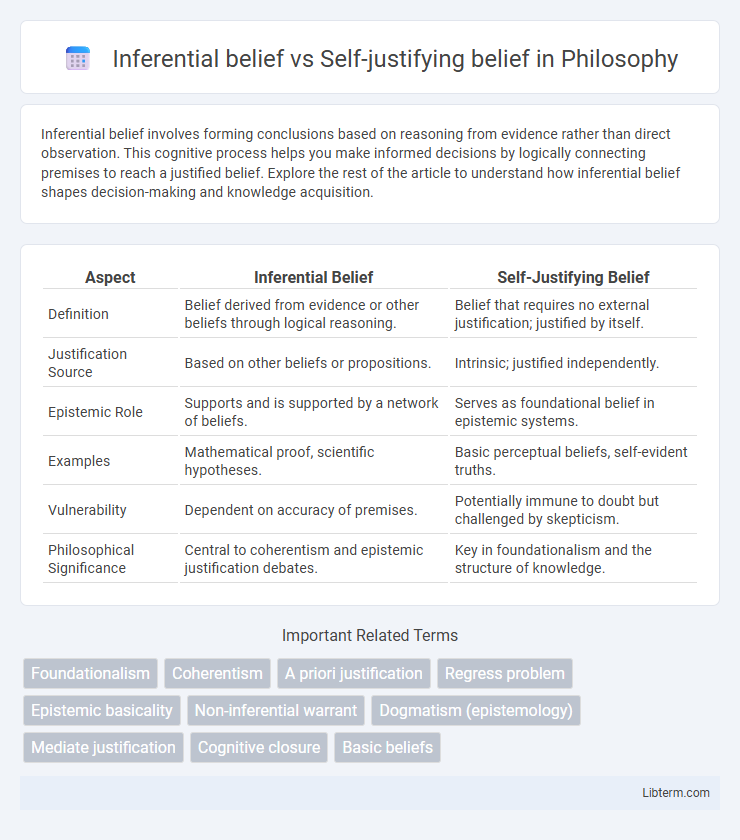Inferential belief involves forming conclusions based on reasoning from evidence rather than direct observation. This cognitive process helps you make informed decisions by logically connecting premises to reach a justified belief. Explore the rest of the article to understand how inferential belief shapes decision-making and knowledge acquisition.
Table of Comparison
| Aspect | Inferential Belief | Self-Justifying Belief |
|---|---|---|
| Definition | Belief derived from evidence or other beliefs through logical reasoning. | Belief that requires no external justification; justified by itself. |
| Justification Source | Based on other beliefs or propositions. | Intrinsic; justified independently. |
| Epistemic Role | Supports and is supported by a network of beliefs. | Serves as foundational belief in epistemic systems. |
| Examples | Mathematical proof, scientific hypotheses. | Basic perceptual beliefs, self-evident truths. |
| Vulnerability | Dependent on accuracy of premises. | Potentially immune to doubt but challenged by skepticism. |
| Philosophical Significance | Central to coherentism and epistemic justification debates. | Key in foundationalism and the structure of knowledge. |
Introduction to Inferential and Self-Justifying Beliefs
Inferential beliefs are formed based on evidence and reasoning derived from other beliefs, allowing individuals to justify new knowledge by connecting it to existing justified beliefs. Self-justifying beliefs, in contrast, do not rely on other beliefs for their justification; they are considered justified independently or foundationally, often serving as the starting point for further inferential beliefs. Understanding the distinction between these belief types is crucial for epistemology, as it addresses how knowledge is structured and validated.
Defining Inferential Belief
Inferential belief refers to a conviction derived from evidence or reasoning based on other accepted beliefs rather than direct experience. It involves a logical connection where the belief is supported by premises that justify its acceptance. In contrast, self-justifying belief is accepted independently, requiring no further inferential support or external validation.
Understanding Self-Justifying Belief
Self-justifying beliefs are foundational convictions that validate themselves without requiring external evidence, distinguishing them from inferential beliefs that depend on supporting premises. These beliefs serve as the epistemic bedrock by providing immediate justification, such as perceptual or introspective beliefs, which underpin further reasoning. Understanding self-justifying belief enhances knowledge theory by clarifying how certain beliefs can be epistemically secure independently of other beliefs.
Key Differences Between Inferential and Self-Justifying Beliefs
Inferential beliefs rely on evidence or premises derived from other beliefs, forming a chain of reasoning to justify their validity. Self-justifying beliefs, in contrast, are justified independently, without requiring other supporting beliefs or evidence. The key difference lies in inferential beliefs' dependence on external justification, whereas self-justifying beliefs possess intrinsic justification.
The Role of Evidence in Inferential Beliefs
Inferential beliefs rely on evidence derived from other beliefs or observations, forming a chain of justification where the credibility of a belief depends on the strength and relevance of supporting evidence. In contrast, self-justifying beliefs are accepted without external evidence, often based on internal coherence or foundational status within a belief system. The role of evidence in inferential beliefs is crucial, as it establishes the rational basis for acceptance and guides the evaluation of truth in epistemology.
Foundations of Self-Justification in Belief Systems
Inferential belief relies on evidence or other justified beliefs as its foundation, forming a web of mutual support within a belief system. Self-justifying belief, by contrast, establishes its own justification independently, serving as an epistemic foundation that does not depend on other beliefs for validation. These foundational beliefs function to prevent the infinite regress problem in epistemology by providing basic certainty or immediate justification within a coherent system.
Examples of Inferential vs Self-Justifying Beliefs
Inferential beliefs are formed by deriving conclusions from other beliefs or evidence, such as believing it will rain because dark clouds appear in the sky. Self-justifying beliefs are accepted without external justification, relying on their own validity, like trusting one's own perception of pain as proof of injury. An example of inferential belief is concluding a friend is upset based on their tone and behavior, whereas a self-justifying belief includes the immediate recognition of one's own emotions without further evidence.
Philosophical Implications of Both Belief Types
Inferential beliefs rely on evidence or other beliefs for justification, highlighting the importance of external validation and the coherence of knowledge systems in epistemology. Self-justifying beliefs, by contrast, possess intrinsic justification without dependence on additional premises, raising critical questions about foundationalism and the nature of epistemic certainty. The philosophical implications of these belief types challenge the boundaries between foundational knowledge and coherentist structures, influencing debates on skepticism and the criteria for justified true belief.
The Impact on Epistemology and Knowledge Theory
Inferential belief, grounded in evidence and logical deduction, shapes epistemology by emphasizing justification through interconnected knowledge structures, while self-justifying belief challenges traditional knowledge theory by positing that certain beliefs can be inherently justified without external support. This distinction impacts debates on epistemic justification, influencing foundationalism and coherentism models by highlighting the tension between dependent and independent sources of belief validation. Understanding these belief types advances knowledge theory by refining criteria for what constitutes justified true belief and the acquisition of knowledge.
Conclusion: Weighing Inferential and Self-Justifying Beliefs
Inferential beliefs derive their justification from evidence or other beliefs, making them dependent on a logical chain, whereas self-justifying beliefs are inherently justified without relying on external support. Weighing inferential and self-justifying beliefs involves assessing the reliability of the evidence versus the foundational status of the belief itself. Prioritizing inferential beliefs enhances rational coherence, but recognizing self-justifying beliefs is crucial for establishing foundational knowledge that does not demand further validation.
Inferential belief Infographic

 libterm.com
libterm.com